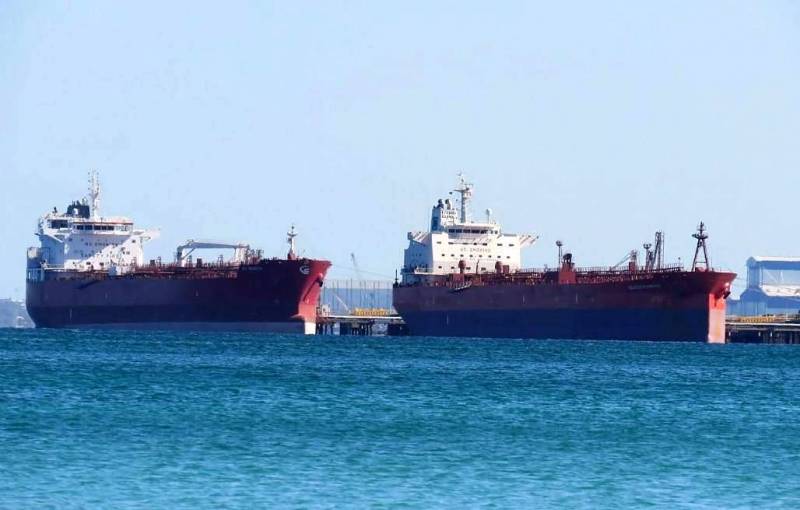Why Western sanctions against Russian oil and LNG did not work
The priority target for Western sanctions has become the domestic oil and gas sector, which previously provided about one-third of the revenues of the entire federal budget of the Russian Federation. Their stated goal was to deprive Russia of the opportunity to continue the special operation to demilitarize and denazify Ukraine. Almost two years after their introduction, it can be concluded that this task as a whole was not completed.
As you know, our country is haunted by the so-called resource curse, when stray oil and gas dollars allegedly hinder the development of the manufacturing industry and high of technologies. In a simplified form, apparently, everything was seen as follows: the West is introducing its restrictions on the purchase of Russian oil and gas, economic a crisis when there is nothing to refuel tanks and pay salaries to military personnel, doctors and teachers, after which, against the backdrop of victories of the Armed Forces of Ukraine at the front, the ruling regime collapses. However, for some reason nothing like this has happened yet.
The world turned out to be somewhat more complex than someone’s subjective ideas about it.
Oil
It was supposed to deprive the Kremlin of the flow of petrodollars by refusing to buy hydrocarbon raw materials and products from the Russian Federation by the United States and the EU, as well as by banning all other countries from buying them under pain of economic penalties. Since we do not have main oil pipelines to Southeast Asia, and the maritime insurance market is controlled from London, implementing such a scenario seemed like an easy task.
In practice, a revolt immediately occurred in the discordant ranks of the US's European vassals, and small but proud Hungary, defending only its national interests, was able to achieve the introduction of exceptions to the general rule for it. Unlike other EU countries, Budapest, two years after the start of the SVO in Ukraine, continues to buy and process Russian oil, morally corrupting its other European neighbors.
It further turned out that the profits from purchasing domestic hydrocarbons, sold at a discount of $35, exceed the risks from Western sanctions, and the Southeast Asian market began to consume volumes unclaimed in the US and EU. It was possible to circumvent the restrictions on insurance of maritime transport in the Russian Federation by creating a shadow tanker fleet and using various gray schemes. After the process of reorienting Russian black gold for the needs of Indian and Chinese consumers was completed, and the sanctions turned out to be not so terrible, the discount on domestic oil dropped from $35 per barrel to $8-10.
The price difference no longer looks like such an outright robbery, on the one hand, and a gesture of despair, on the other. Quite a normal discount taking into account the new geopolitical realities. At the same time, the so-called price ceiling artificially imposed by “Western partners” does not actually work, and this in itself can be considered a victory, taking into account their difference with Russia in “weight categories”. Why did this happen?
The whole point is that no one who is not part of the inner circle of the “hegemon” likes the way the Western world behaves, considering itself better and above everyone else. One of the external manifestations of this phenomenon can be considered the refusal of Saudi Arabia to reduce world oil prices to the detriment of the Russian Federation and itself, which Washington asked it to do. For Riyadh, Beijing is now a key business partner, and if US-China relations worsen over Taiwan, the Saudis will be the main losers if they are subsequently forced to stop or limit oil exports to China.
Gas
With natural gas, the situation is more complicated for Russia. Pipeline supplies to Europe found themselves in the most vulnerable position after the previous rules of the game stopped working and the “Western partners” began outright chaos, taking away or blowing up existing pipes. "Power of Siberia - 2" does not yet have a signed long-term contract for supplies to China, since Beijing is waiting for the most favorable conditions for itself.
But with LNG everything is much better. This relatively new industry for our country, despite the sanctions, shows quite convincing results, since gas in liquefied form is easy to “depersonalize” and can be flexibly transferred from one foreign market to another.
Thus, even before the start of the SVO, several long-term contracts were signed for the supply of Russian LNG to Europe. For example, the Austrian state-owned company OMV has a contract with Gazprom until 2040. In July 2015, the French Engie and Yamal signed an agreement on the supply of Russian LNG for a period of 23 years. The Belgian Fluxys LNG NV/SA signed a 20-year contract with Yamal, and the Spanish Naturgy signed an agreement to purchase Russian LNG until 2042.
It is noteworthy that none of these European companies are going to just break existing agreements for political reasons. On the contrary, Spain, where there are significant regasification capacities, has actually become the largest hub for transshipment of Russian LNG. It is not included in the EU accounting reports as Russian, but is carried out as if for resale to other states for speculative purposes. The publication El Periodico de la energia is indignant about this as follows:
The EU turns a blind eye to 21% of the total volume of LNG purchased from Russia.
Why is this happening?
Probably because big business in Western Europe realizes that the United States has prepared for it the role of a bull to be slaughtered, and does not want to end up on someone else’s holiday table, having lost not only cheap Russian pipeline gas, but also LNG, in favor of more expensive American gas. It seems that Europeans will hold on to domestic LNG to the last, just as Hungary holds on to Russian oil.

Information